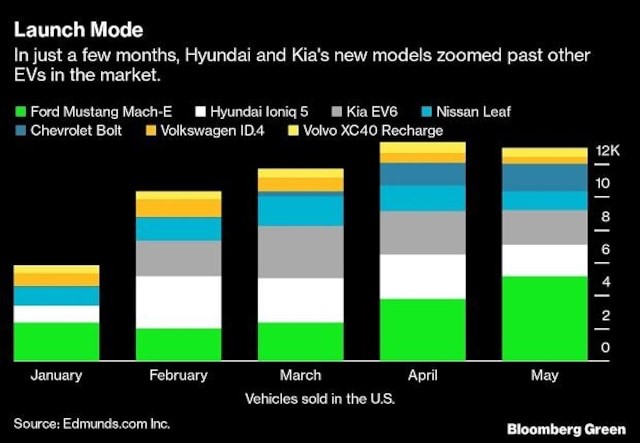The US market rocks for Hyundai’s Ioniq 5 and the Kia EV6
According to a Bloomberg story, the narrative that EVs are Teslas and Elon Musk may be shifting.
Tesla still sells significantly more vehicles than Hyundai, but it took Tesla a decade to deliver as many electric vehicles as Hyundai did in a few months.

This year, the South Korean automaker introduced two new battery-powered vehicles, the Hyundai Ioniq 5 and its sibling, the Kia EV6, which immediately dominated the sales charts, surpassing the Nissan Leaf, Chevrolet Bolt, and all other electric vehicles not made by Tesla. Through May of this year, Hyundai sold 21,467 of these two vehicles in the United States, outselling even the red-hot Ford Mustang Mach-E, which was purchased by 15,714 drivers.
"From an electric vehicle standpoint, "they're really just sweeping the floor," said Edmunds analyst Joseph Yoon. "I honestly have no idea if any local dealers have any in stock."
Agreed, Hyundai is not a start-up. According to Steve Kosowski, manager of a long-term strategy for Kia America, the company began designing its current bestsellers roughly six years ago. At the time, the Chevrolet Bolt had recently debuted on the market, and Kia was considering a vehicle of comparable size and scope. Ultimately, Kosowski and company gave the green light to something significantly larger, sportier, and sexier—at a slightly higher cost. "The thought was, with the platform we have and the market knowledge we have, let's come up with a bold, game-changing proposition," he recalls. "We will make it clear that Kia is present."
The timing was advantageous. In the United States, EV adoption is increasing due to a rise in both environmental concerns and gasoline prices. Even though there is a demand for battery-powered vehicles, the selection is still limited. Only a handful of the roughly 30 models available on the US market can be purchased for less than $45,000, and the majority of those are relatively small, dated vehicles like the Nissan Leaf.
The Ioniq 5 and EV6 both offer the cargo space of a compact SUV, a size and body style that has recently taken over U.S. garages. Both vehicles utilise the same modular platform and have identical motors, batteries, and speed specifications. They are equipped with screens and charge at some of the industry's quickest rates, adding nearly 16 miles of range per minute under ideal conditions. In addition, they offer a few unique features to the market, including pedals to adjust regenerative braking and bi-directional power (yes, you can run power tools or charge another EV with one of these machines).
According to Yoon of edmunds.com, they are attracting buyers with smaller budgets who might have otherwise purchased an entry-level sedan. And yet, they are luxurious enough on the inside to pull from the top of the market as well, as drivers abandon internal combustion engine-powered luxury vehicles.
"These two automobiles are priced and sized appropriately for a large number of buyers," Yoon stated. "And I believe there is an inherent level of trust when a major manufacturer enters the mainstream market."
According to Kia, approximately three-quarters of EV6 buyers had previously owned a vehicle from another brand, and only one in ten had previously owned a plug-in vehicle. Bloomberg Intelligence says that the waitlist for the EV6 is about six months long and that the average sale price is a few thousand dollars more than the sticker price. This shows that most buyers are willing to pay more.
"Our dealers report that these vehicles sell within hours," said Eric Watson, vice president of sales for Kia America, Inc.
Kosowski stated that the new Hyundai products are capitalising in part on "Tesla fatigue" as the first-mover sedans and SUVs become commonplace even in non-coastal states. According to Edmunds.com, roughly 60% of Hyundai and Kia owners who recently traded in their vehicles remained brand loyal.
Hyundai intends to release a new battery-powered vehicle annually for the remainder of the decade and is investing $16.5 billion to increase EV production in South Korea. The automaker hopes to capture 12% of the global EV market, or approximately 3.2 million vehicles, by 2030.
So, when is India likely to see Hyundai EVs? Hyundai Motor India has said that by 2028, the company will introduce six EV models to India, including SUVs, CUVs, and sedans. The plan is for a staggered launch, but all of these vehicles will be manufactured or assembled locally. All of these automobiles will be manufactured specifically for the Indian market and may be derived from global products. Approximately 4,000 billion will be invested in the development and launch of these vehicles.
 EVStory.in - India's best EV Portal
EVStory.in - India's best EV Portal